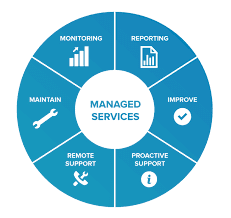Types of Managed IT Support That You Should Know
Businesses are integrating different communication channels as technology grows advanced and complex. The need for large computer rooms and handy IT staff has become non-existent over the years. Most communication takes place via mobile devices, and people leverage this medium to connect with their colleagues. It brings to the fore the validation of outsourced IT services, including MSP support that one cannot neglect while talking about robust IT infrastructure.
Today, organizations need Managed IT support services to enhance their IT setup and ensure security to the servers. There are various managed service providers (MSPs) that help you focus on your core business areas while they take on the challenge to keep your IT operations running. Let us read about the types of Managed IT support that can make you decide better while hiring an MSP for your business.
Lower-level MSPs
The most common service that an MSP provides upon hiring is support to your computer system and network. It includes MSP support services, such as software integration, network monitoring, and tracking issues, which keep your server secure and away from dangers. A low-level MSP notifies the client about the risk and threats and provides solutions simultaneously. However, pure-play MSPs will avoid taking responsibility in the business concerning IT revamp or IT planning of a client’s business. The authority lies in the hands of the business owners. MSPs perform basic IT functions required to safeguard the IT interest at hand.
Mid-level MSPs
They are also known as value-added MSPs. They offer mandate support to any organization besides resolving complex challenges in daily IT tasks. For example, once the MSP has set up a software system, their IT experts will monitor the performance and dive deep into the technicalities of the system. They develop robust plans to combat any security threat and provide timely measures, such as sharing warning signs and taking immediate actions in case of a data breach.
Apart from this, the mid-level managed service provider looks after software maintenance and update programs across the client’s network. The network needs to be updated with each new revision or when a newer security patch gets released. Overall, they help you expand and contract the services based on our requirements.
High-level MSPs
A high-level MSP offers protection to the IT infrastructure, including wireless network support, data analytics, and communications services. At this level, the MSP has access to a high-tech networking system that can be scrutinized through an authorized security person, regardless of the location. They keep you informed of any developments that may lead to change in the course of IT operations. Besides, as a business, you’re offered software-as-a-service or SaaS programs under MSP support services that you can run on a subscription-based model.
When it comes to managed IT services, it is important to hire a reliable MSP that ensures security and reliability to your IT setup. You can outsource all your tasks or consider MSP support for niche activities. OffsiteNOC is an expert MSP offering excellent MSP support services in the area of network integration and security. If you’re planning to outsource your IT tasks, you can connect with their team of experts for smart solutions.


Comments
Post a Comment